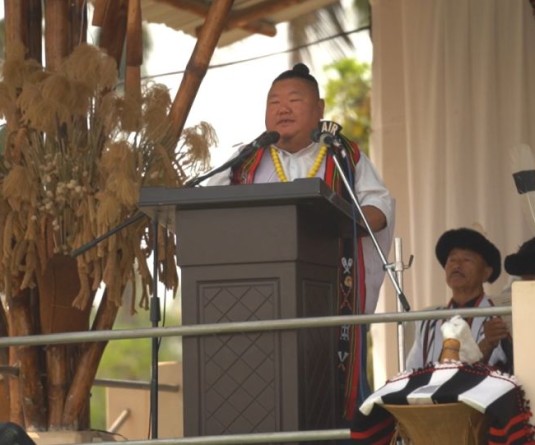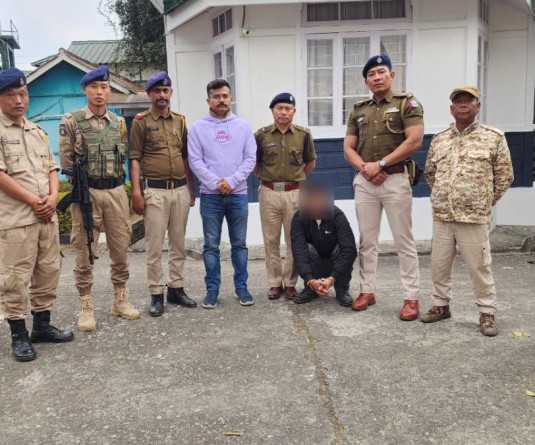
Tuensang, April 29 (MExN): In a significant development, the Eastern Nagaland People's Organisation (ENPO) announced today that it is “compelled” to temporarily narrow down its long-standing demand for a “Separate Statehood” to consider the “Frontier Nagaland Territory” (FNT) offer put forth by the Government of India (GoI).
However, this acceptance comes with crucial caveats, including a stipulated review of the FNT arrangement after 10 years, and that all other unresolved matters will be taken up through democratic political processes.
The ENPO, while maintaining its demand for a “Separate Statehood”, stated that it is compelled to temporarily narrow down its stance, considering the inability of the GoI, it underscored in a press communiqué.
According to the organisation, the decision was arrived at after “comprehensive studies and contemplation” of the “FNT” arrangement offered by the Union Ministry of Home Affairs (MHA), GoI (Minister of State Draft), and the State Government’s comments on the issue.
Autonomy in letter and spirit
The ENPO strongly reiterated the need for an arrangement with Executive, Legislative, and Financial Autonomy, and stated that this must not be infringed upon under the offered Frontier Nagaland Territory.
It emphasised that this autonomy must be delivered in letter and in spirit, noting that it is the “basic principle” envisaged in both the MoS draft of the MHA and the State Government’s comments.
The organisation also asserted that the parameters of the offered FNT should not be constrained by any article of the Constitution of India and/or statutory laws, and that Constitutional provisions and statutory laws must not inhibit its establishment in any manner.
Shared Autonomy category list
The ENPO maintained that, as per the agreed position of “Legislative, Executive and Financial autonomy within Nagaland State,” all existing subjects in the State shall co-exist within the FNTA (Frontier Nagaland Territory Authority).
To this end, it outlined major subjects to be included under what it termed a ‘shared autonomy category list’ to avoid issues arising later if only selective powers (subjects) are given to the FNTA.
This list includes the establishment of a permanent High Court in Nagaland with a permanent bench in the FNT.
The ENPO also called for the enhancement of the State’s non-plan allocation from the Consolidated Fund of India.
In order to rescue Nagaland from the huge deficits that hinder the State’s progress, it urged the GoI to empower the State Government to pass enabling laws under Article 371(A).
The organisation further stated that it would demand additional Parliamentary seats in both houses of Parliament during the upcoming delimitation exercise.
Additionally, noting that the State is divided into ‘three tribal blocks’ — Tenyimia, Central Nagas, and Eastern blocks — it argued for the sharing of the Deputy Chief Minister post between the two non-Chief Ministerial blocks in the event of multiple Deputy CMs.
The ENPO also proposed that the State Government partner with the organisation on specific priority areas for the development of Eastern Nagaland.
FNTA under Article 371(A)?
According to the ENPO, the MoS draft envisaged the creation of the FNTA under Article 371(A) of the Indian Constitution, which has been agreed upon by the State Government.
Accordingly, Article 371(A) should either be reviewed or suitably amended to incorporate the provision relating to the FNT, it added.
The ENPO further proposed a conventional power-sharing mechanism that does not infringe on the basic principles, where both FNLA and ENLU members can work together under a decentralised planning and execution system.
The upgradation and modernisation of the Village Guard organisation, along with the enhancement of their salary/honorarium, also remains a critical component of the proposed arrangement, it stated.
The ENPO noted that with the establishment of the FNT, there shall be a Joint Monitoring Committee comprising representatives from the MHA, the State Government, the FNTA, and the ENPO.
In this connection, the ENPO once again appealed to the Chief Minister of Nagaland to uphold his political statement, wherein he reportedly categorically stated that “the State Government will give full cooperation for the development of ENPO Areas and whatever decision on FNT the GoI takes...”
The ENPO stated that its formal stance has been conveyed to the MHA and will also be shared with the State Government at the earliest.
Key Stance of ENPO on Frontier Nagaland Territory
Autonomy and Governance:
Shared Autonomy Category List – Key Subjects
Constitutional Provisions The draft MoS proposal for constituting the FNTA under Article 371(A) has been agreed to by the State Government. Thus, Article 371(A) should be reviewed, modified, and suitably amended to incorporate these provisions Others -ENPO proposes a conventional power-sharing mechanism that respects fundamental principles and allows members of both the FNLA (Frontier Nagaland Legislative Assembly) and ENLU (Eastern Nagaland Legislative Unit) to function under a decentralised planning and execution system. -Emphasises the upgradation and modernisation of the Village Guard organisation, including enhancement of their salary and honourarium, as a vital part of the FNT arrangement. |






